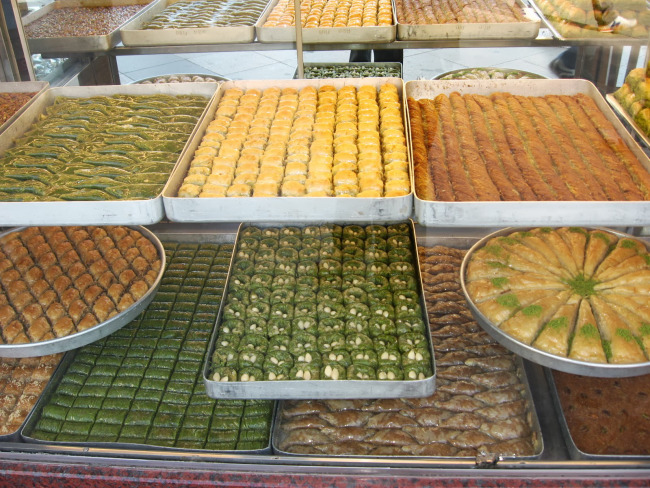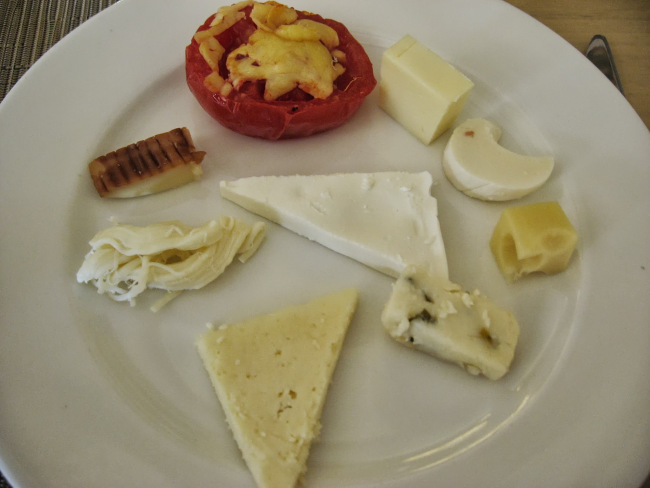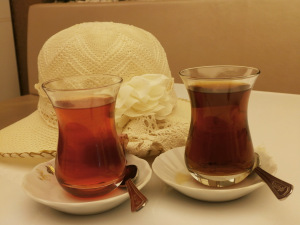“Vegetarian!!!” intoned our cousin D, succinctly. “No fish, no chicken, no egg, no meat.”
The waiter in the restaurant in Avanos, Turkey, nodded enthusiastically and then…looked blankly at us. Of the three of us, only D was vegetarian, rigidly so in fact and we needed to be sure of what would be served.
By now, she was prepared for this ambiguous reaction.
She reached into her pocket and whipped out a parchment of paper and brandished it at the waiter. Squinting at it, his expression immediately cleared. With a broad smile, he opened the menu with a flourish and pointed out the dishes that would suit her. A ritual that cut down our gesticulating time drastically. One vegetarian meal-rice and lentil soup with a unique Turkish flavour, a fresh salad flavoured with olive oil, pepper and salt and Ayran ( a salted buttermilk drink) had been requested with no fuss at all. We ordered Kebabs.
Yet another lovely Turkish meal eaten with the vista of the flowing Avanos river and the silhouette of the town’s mosque as the backdrop.
Readers of this piece, who have no restrictions on the food they eat, and have never faced this particular problem, will perhaps need some explanation. D is a true-blue, dyed-in-the-wool vegetarian. She had a liberal Hindu Brahmin upbringing, where vegetarianism was a tradition and later, for her, a conscious choice. She does not eat eggs, as well, and with that particular sensitivity of vegetarians, the mere smell of eggs (which she ferrets out easily) makes her nauseous, thereby ruling out certain desserts as well and in one memorable case, a naan bread cooked on a girdle used for eggs.
Vegetarian food is not a big deal in India, or in any country where large numbers of Indians are settled. Certain Indian religions such as Jainism, Buddhism and some castes among Hindus are very strict about the food that can be consumed. Thus countries like England, Singapore, the U.S.A which have large numbers of Indian expats have vegetarian eateries and it is not difficult to procure ‘pure’ vegetarian food, should one have to resort to extreme measures.
We knew for a fact that
1.) Turkish people spoke little English and we were travelling on our own, with no guide to translate for us.
2.) This was a primarily meat-eating country. There have been instances of tourists from India, who follow the very strict Jain religion, and who have taken an Indian cook along on their excursions to such countries.
Aside from the budgetary constraints of such an arrangement, the flavour of a destination is decidedly enhanced by the local food. So, eating Indian food at a foreign locale was a no-no.
3.) And D herself, aside from her caution about the contents, was keen to try local food.
Certainly, a very hungry D, wistfully dreaming of aloo sabzi-puri and kanda-poha (Indian foods), while tramping through Hagia-Sofia and Ephesus, was not going to be cheery sight. So she had carried some heat-and-eat vegetarian stuff in order to hedge her bets. This added to the weight of the luggage, but we figured, well worth the risk.
Our first destination was Izmir. We had nearly two days of gesticulating and in one case, a fellow diner roused from his Hookah to translate for us, before we hit upon a simple idea. Aside from the wonderful stay, our high-end Izmir hotel boasted some staff who spoke good English. After the first 36 hours, we quickly cornered one of these efficient persons, a young girl called Farha, and had her write the golden words-“no egg, no fish, no meat”, in Turkish, on a piece of paper.
This paper became our “open sesame” mantra to easy eating.
Once they read the precious paper, we had the tourist-friendly managers and waiters, accommodating her likes and dislikes, and in some cases even cooking special dishes for her. She could enjoy cheese Borek ( a layered pastry stuffed with cheese), a lovely eggplant salad with garlic and yogurt( which we all loved), vegetarian Dolmasi (grape leaves stuffed with rice) and fresh salads made for her especially.
At times, she could order casseroles with the vegetables that she preferred or in extreme cases, fall back on lentil soup and rice, that old favourite. Yogurt seems to be as ubiquitous in Turkey as it is India. So yogurt salads and Ayran helped us out. Each restaurant had its own favourite recipe for lentil soup, salads and rice and she never went hungry. A win-win situation for us. It goes without saying that we were also able to try out these dishes, which in the normal course of events, we would not have. Besides the eggplant salad, which showed many delicious local variations, my favourite was a unique dish of baby onions sautéd in olive oil and flavoured with whole garlic pods, served in a restaurant in Avanos.
We also had the local Turkish bean salads, cheeses, olives and breads. Chestnuts and sweet corn, roasted or steamed, is also available on street corners as also fresh fruit such as watermelon.
Dessert in Turkey means Kadayif (vermicelli with pistachio and whipped cream), Baklava and Turkish delight, in dozens of varieties.
We were spoilt for choice. Scouting the neighbourhood, we would always find a great sit-down outlet for desserts near our place of stay and end the day with a sticky calorie-laden, delicious sweet.
We learned a few lessons from this experience-
1.) The local food is always good, provided one is eager to try it. With some hits and misses, one can always find some dishes that one likes and even relishes.
2.) Where there is a will, there is a way!
3.) Travel is a complete experience, a sum total of what we see, hear, eat, smell and feel. In its entirety, it is immensely satisfying and exhilarating.
FYI…. she carried all the heat-and-eat packs back home.
Ujwala Shenoy Karmarkar is a practicing Anaesthesiologist working in Mumbai. She loves conversations, meeting people, reading and listening to Hindi film songs. She writes about anything that moves her. She blogs at http://ujwalasblog.wordpress.com









Excellent gourmet article. I thought you would go to the Kitchen and help the cook to make Varan Bhaat, and with yogurt available in plenty, the good ol’ “thair saadam” or dahi butti with rai/jeera phodni would have added a repertoire to the kitchens of the Hotels you visited. I would have done that. Once I told a Hotel owner in Mahabaleshwar to make “Soul-Kadhi” with fresh buttermilk instead of coconut milk, easier to make, easy on calories and tastes as good if not better. She tell me it is very popular and is making pots of money with much less effort.
Sheet-Kadhi, I can eat 365/year !!!!!